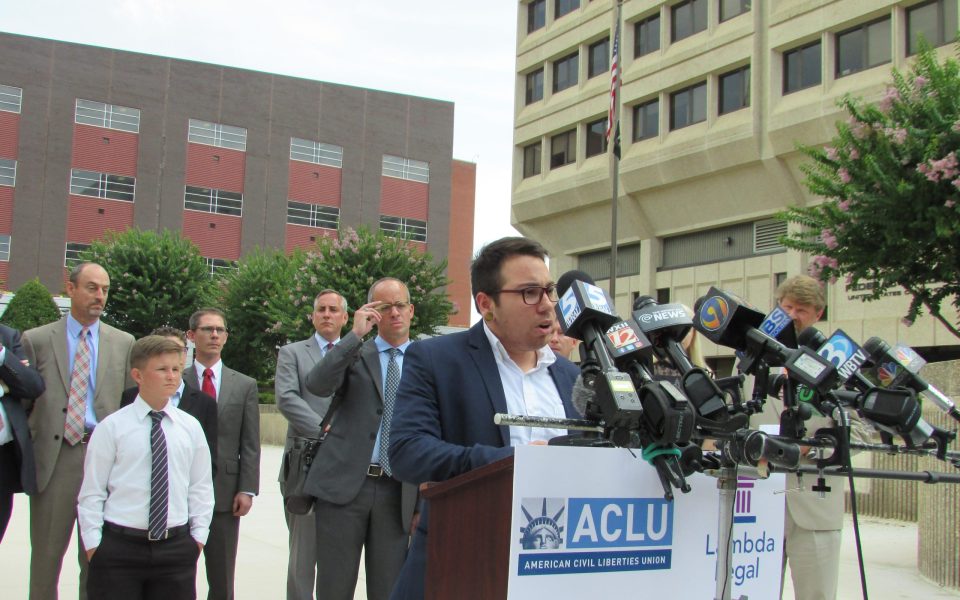As usual, Gov. Pat McCrory and his extremist Republican allies in the General Assembly are inflicting far more pain on themselves than their adversaries ever could.
The order handed down by US District Judge Thomas Schroeder on Aug. 26 barring the UNC system from enforcing the bathroom provision of HB 2 quotes Butch Bowers, the governor’s lawyer.
“The record reflects what counsel for Governor McCrory candidly speculated was the status quo ante in North Carolina in recent years: Some transgender individuals have been quietly using bathrooms and other facilities that match their gender identity, without public awareness or incident,” Schroeder writes. The judge continues by quoting Bowers as speculating further that even if the law remains in force, “Some transgender individuals will continue to use the bathroom that they always used and nobody will know.”
In the next passage, Schroeder effectively demolishes the state’s argument that HB 2 is necessary to protect privacy and public safety, even if unintentionally: “This appears to have occurred in part because of two factors. First, the record suggests that, for obvious reasons, transgender individuals generally seek to avoid having their nude or partially nude bodies exposed in bathrooms, showers and other similar activities. Second, North Carolina’s decades-old laws against indecent exposure, peeping and trespass protected the legitimate and significant state interests of privacy and safety.”
It’s refreshing to see a conservative federal judge — Schroeder was appointed by President George W. Bush — actually make a conservative ruling instead of enabling the radical agenda of McCrory and the Republican leadership in the General Assembly. Schroeder notes that there was an arrangement in place before the Republican lawmakers called a special session in March, and it seemed to be working well, with exactly zero reports of discomfort, awkwardness or social harm caused by transgender people using the bathroom that accords with their gender identity. In light of those facts, a conservative judge would have no choice but to grant a preliminary injunction to prevent plaintiffs from suffering irreparable harm before the case is decided in trial. Schroeder rules that UNCG student Payton Grey McGarry, UNC School of the Arts student Hunter Schafer and UNC-Chapel Hill employee Joaquin Carcaño “have clearly shown they will suffer irreparable harm in the absence of preliminary relief.”
Schroeder notes that all three submitted declarations that single-occupancy bathrooms are generally unavailable at UNC, with the two students indicating they were not aware of any single-occupancy facilities in the buildings in which their classes are held. The order states that the bathroom provision of HB 2 “therefore interferes with these individuals’ ability to participate in their work and educational activities. As a result, some of these plaintiffs limit their fluid intake and resist the urge to use a bathroom whenever possible. Such behavior can lead to serious medical consequences, such as urinary tract infections, constipation and kidney disease. This concern is not merely speculative; there is evidence that one of the individual transgender plaintiffs has already begun to suffer medical consequences from behavioral changes prompted by” the law.
For a judge to grant a preliminary injunction the law also requires that plaintiffs show that they’re likely to succeed on the merits of their case. The plaintiffs argue that HB 2 violates Title IX of the Civil Rights Act, which holds that “no person… shall, on the basis of sex, be excluded from participation in, be denied the benefits of, or be subjected to discrimination under any educational program or activity receiving federal financial assistance.” For purposes of bathroom usage by transgender people, the definition of sex discrimination, the US Department “began taking the position that covered institutions must treat transgender individuals consistent with their gender identity,” as Schroeder notes.
Gov. McCrory, Senate President Pro Tem Phil Berger, House Speaker Tim Moore and their social-conservative backers may not like it, but they can’t accuse Judge Schroeder of “legislating from the bench”: The Bush appointee notes that in April the Fourth Circuit Court of Appeals concluded in its ruling on GG v. Gloucester County that the courts must defer to the Obama administration’s position on bathroom usage.
No Chapel Hill liberal, Judge Schroeder notably ruled in favor of McCrory and the Republican leadership on the matter of the state’s restrictive election law, but the Fourth Circuit overruled him and overturned the law, finding that the provisions “target African-American voters with almost surgical precision.”
Maybe that experience has chastened him.
“While district courts are often said to be the ‘front-line experimenters in the laboratories of difficult legal questions,’” Schroeder wrote, “they are bound to follow circuit precedent. To accept defendants’ argument — which is more an attack on GG’s reasoning than a legal distinction — would violate that obligation. Therefore, at this early stage on a motion for preliminary relief pending trial, it is enough to say that GG requires Title IX institutions in this circuit to generally treat transgender students consistent with their gender identity, including in showers and changing rooms.”
Join the First Amendment Society, a membership that goes directly to funding TCB‘s newsroom.
We believe that reporting can save the world.
The TCB First Amendment Society recognizes the vital role of a free, unfettered press with a bundling of local experiences designed to build community, and unique engagements with our newsroom that will help you understand, and shape, local journalism’s critical role in uplifting the people in our cities.
All revenue goes directly into the newsroom as reporters’ salaries and freelance commissions.





Leave a Reply